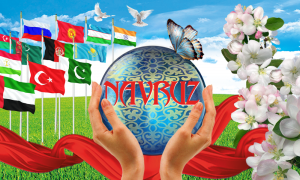“Navruz” means “new day”

The Navruz holiday associated with the vernal equinox is celebrated, first of all, by Tajiks, Uzbeks, Tatars, Kazakhs, Bashkirs, Kyrgyz and other peoples of Asia.
Translated from Farsi, “Navruz” means “new day” — the beginning of the New Year according to the solar reckoning, which coincides with the spring equinox. It differs from the Muslim New Year, as the basis of the Muslim calendar is the lunar annual cycle.
Historians determine the age of Navruz in more than three thousand years, and the homeland of this holiday is Khorasan (a historical region in Central Asia). The holiday not only survived the Arab conquest, but also became an integral part of the culture of many peoples professing Islam. In 2009, the holiday of Navruz was included by UNESCO in the list of intangible cultural heritage of mankind. And in 2010, the UN General Assembly declared March 21 as the International Day of Navruz and called on all countries to make efforts to popularize this ancient holiday in the world.
On the day of the vernal equinox — March 21, Tajikistan celebrates its brightest state holiday.
Navruz holiday in Tajikistan enjoys the same popular love as the New Year in Russia. The customs of this celebration bizarrely mixed the ancient traditions of fire-worshipers-Zoroastrians, the establishment of Islam and the mystical teachings of the Central Asian Sufis. The symbol of Navruz is sumanak or sumalak — a ritual dish with sprouted wheat grains, symbolizing a rich future harvest. By the morning of the main day of the holiday, sweet pasta is cooked from fresh sprouts in a cauldron, which is usually distributed to neighbors and friends. It is believed that before you try sumanak, you need to make three wishes. They will surely be fulfilled in the new year.
The main tradition of Navruz is to give gifts. From early morning, children from neighboring houses come together to walk around the yards and congratulate the owners on the «Great Holiday», receiving in return sweets and fresh. pastries. It is customary to greet guests on holiday days with the words “Navruzaton pyruz bod” (“Happy Navruz holiday”). At the family festive table during Navruz there must be 7 dishes whose name begins with the letter “c”: sumanak (pasta made from sprouts with flour), sipand (seeds of rue), sirco (vinegar), semeni (sprouted wheat), sabza ( greens), seb (apples), sire (garlic), sumy (barberry). Obligatory attributes of Navruz in Tajikistan are folk amusements — wrestling “gushtingiri”, goat-making “buzkashi”, horse racing, jumping over a fire and much more.

 Суди ноҳияи Бобоҷон Ғафуров
Суди ноҳияи Бобоҷон Ғафуров 